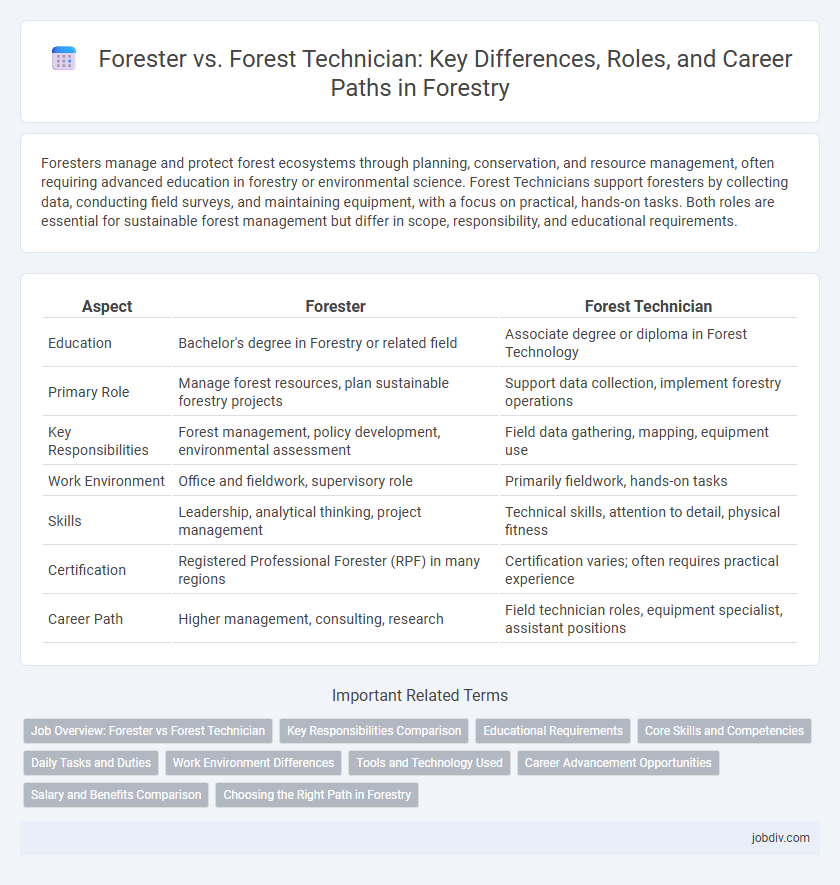Foresters manage and protect forest ecosystems through planning, conservation, and resource management, often requiring advanced education in forestry or environmental science. Forest Technicians support foresters by collecting data, conducting field surveys, and maintaining equipment, with a focus on practical, hands-on tasks. Both roles are essential for sustainable forest management but differ in scope, responsibility, and educational requirements.
Table of Comparison
| Aspect | Forester | Forest Technician |
|---|---|---|
| Education | Bachelor's degree in Forestry or related field | Associate degree or diploma in Forest Technology |
| Primary Role | Manage forest resources, plan sustainable forestry projects | Support data collection, implement forestry operations |
| Key Responsibilities | Forest management, policy development, environmental assessment | Field data gathering, mapping, equipment use |
| Work Environment | Office and fieldwork, supervisory role | Primarily fieldwork, hands-on tasks |
| Skills | Leadership, analytical thinking, project management | Technical skills, attention to detail, physical fitness |
| Certification | Registered Professional Forester (RPF) in many regions | Certification varies; often requires practical experience |
| Career Path | Higher management, consulting, research | Field technician roles, equipment specialist, assistant positions |
Job Overview: Forester vs Forest Technician
Foresters manage forest resources through planning, conservation, and sustainable harvesting, often requiring a degree in forestry or natural resource management, and responsibilities include forest inventory, health monitoring, and policy implementation. Forest Technicians assist with data collection, mapping, and fieldwork under the supervision of foresters, utilizing skills in GPS technology and forest measurement but typically needing a technical diploma or associate degree. The primary distinction lies in the scope of decision-making authority and educational requirements, with foresters focusing more on management and planning, while forest technicians support operational tasks.
Key Responsibilities Comparison
Foresters primarily develop and implement sustainable forest management plans, conduct timber cruising, and oversee forest regeneration efforts, ensuring compliance with environmental regulations. Forest technicians support these activities by collecting field data, performing measurements, mapping forest areas using GPS technology, and assisting in the maintenance of forest health and inventory records. While foresters focus on planning and decision-making, forest technicians handle operational and technical tasks critical to forest management execution.
Educational Requirements
Foresters typically require a bachelor's degree in forestry, natural resources, or environmental science, emphasizing advanced knowledge in forest ecology, management, and policy. Forest Technicians usually need an associate degree or a technical diploma focusing on practical skills like data collection, mapping, and equipment operation. Employers increasingly prefer candidates with relevant certifications and hands-on experience for both roles.
Core Skills and Competencies
Foresters possess advanced skills in forest management, including ecosystem assessment, resource planning, and policy implementation, enabling them to oversee sustainable forestry operations. Forest Technicians specialize in technical competencies such as data collection, equipment operation, and field measurements to support on-site forest inventory and monitoring. Both roles require proficiency in geographic information systems (GIS), ecological principles, and strong problem-solving abilities to ensure effective natural resource management.
Daily Tasks and Duties
Foresters manage forest resources through planning, inventory, and conservation activities, often conducting surveys, analyzing data, and developing management plans to ensure sustainable forest use. Forest Technicians perform hands-on fieldwork, including planting trees, monitoring forest health, maintaining equipment, and assisting in wildfire management. Both roles require knowledge of ecology and forest operations, but Foresters focus more on strategic planning while Technicians engage in practical implementation.
Work Environment Differences
Foresters typically work in both office settings and diverse outdoor environments, managing forest resources, conducting research, and planning conservation projects. Forest technicians primarily engage in fieldwork, collecting data, maintaining equipment, and supporting forest management operations under the supervision of foresters. The work environment for forest technicians is more physically demanding and hands-on, while foresters balance administrative duties with outdoor activities.
Tools and Technology Used
Foresters primarily use Geographic Information Systems (GIS), remote sensing technology, and computer modeling software to manage forest resources and plan conservation efforts. Forest Technicians rely heavily on handheld GPS units, laser rangefinders, and chainsaws for field data collection, inventory tasks, and timber measurement. Both professions integrate drones and mobile apps to enhance accuracy and efficiency in forest monitoring and management.
Career Advancement Opportunities
Foresters typically have broader career advancement opportunities in forest management, policy development, and environmental consulting due to their higher education requirements, usually a bachelor's degree in forestry or related fields. Forest Technicians often advance through gaining specialized technical skills and certifications, which can lead to supervisory roles or positions in field operations and natural resource inventory. Both roles offer pathways to leadership positions within government agencies, private industry, and conservation organizations, but foresters generally have a wider scope for advancement in strategic planning and environmental stewardship.
Salary and Benefits Comparison
Foresters typically earn higher salaries than forest technicians, with median annual wages around $65,000 compared to $44,000 for technicians, reflecting their advanced responsibilities in forest management and policy planning. Foresters often receive comprehensive benefits including health insurance, retirement plans, and professional development opportunities, whereas forest technicians may have more limited benefits packages due to entry-level or technical roles. Salary and benefits for both positions vary based on geographic location, employer type, and level of experience within the forestry sector.
Choosing the Right Path in Forestry
Foresters oversee forest management plans and ensure sustainable practices while forest technicians support these efforts through data collection and fieldwork. Choosing the right path depends on your interest in strategic planning versus hands-on technical roles in forestry operations. Understanding the distinct responsibilities and required qualifications helps align career goals with the demands of ecosystem management and resource conservation.
Forester vs Forest Technician Infographic

 jobdiv.com
jobdiv.com